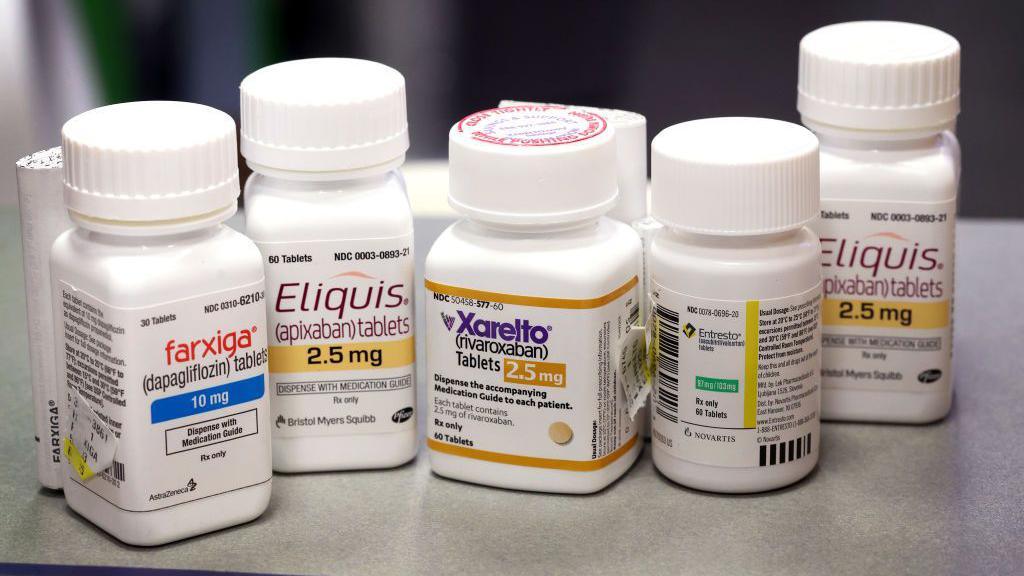US strikes deal to cut cost of 10 drugs for Medicare users

The 10 prescription drugs include those used to treat blood clots, heart failure and diabetes
- Published
President Joe Biden has said he wants to stop handing drug companies a "blank cheque", after the government announced a deal to significantly cut the cost of 10 common prescription drugs for millions of Americans.
The price cuts of between 38% to 79% will come into effect in 2026, the Centers for Medicare & Medicaid (CMS) said.
They will apply to people enrolled in the Medicare programme, which provides health coverage for Americans aged 65 and over.
The new policy is expected to cover about nine million people who use at least one of the drugs, the Department of Health said.
What to know: Medicare negotiation lowers drug prices
- Published16 August 2024
US government targets lowering cost of 10 key drugs
- Published29 August 2023
At an event in Upper Marlboro, Maryland, Thursday President Joe Biden said he no longer wanted to hand big pharma a blank cheque and described the deal as a "relief for the millions of seniors that take these drugs to treat everything from heart failure, blood clots, diabetes, arthritis, Crohn’s disease, and more".
He said that the changes were part of the Inflation Reduction Act, passed by Democrats in 2022 thanks to a tie-breaker vote by Vice-President Kamala Harris, which allows Medicare to negotiate drug prices directly with manufacturers.
The public announcement of lower prescription price costs marked the first joint public appearance for Ms Harris and Mr Biden since he stepped out of the race last month.
Xavier Becerra, the secretary of the US Department of Health, said that the deal represented the first direct negotiation between Medicare and drug companies.
"The American people are better off for it,” Mr Becerra said.
The US Department of Health estimated that the policy would save Medicare around $6bn (£4.7bn) if it was enacted today, based on last year's drug prices.
In a hypothetical example provided by the department, a person enrolled in Medicare using the Crohn's disease treatment drug Stelara, part of the 10 negotiated prescription drugs, would see their bill reduced from $3,400 to $1,100 for a 30-day supply.
Medicare is a national health insurance programme funded by the US government. It helps subsidise healthcare services for anyone aged 65 or older, as well as younger people with certain disabilities.
For prescription drugs, patients pay some out-of-pocket fees while Medicare helps cover part of the cost.
The Biden administration said the new discounts will save $1.5bn in out-of-pocket costs for prescription medications in 2026.
Last year Tina Romney, 56, told the BBC that her husband last year faced a $800 per prescription bill for Entresto, one of the drugs the Biden-Harris administration has lowered.
Knowing the costs were being reduced were a "relief", she said. "I got a few years to get there [Medicare coverage], but now I know I don't have to worry about the cost when I do."
Drugs covered include the widely used diabetes treatments, external Januvia and Jardiance, blood thinners Eliquis and Xarelto and leukaemia drug Imbruvica.
Junuvia faces the steepest price reduction, going from $527 in 2023 to $113 in 2026.
Linda Jones,73, who takes Junuvia, said the announcement was a "big deal, when you get old you shouldn't have to live your life in fear".

Linda Jones,73, takes one of the prescriptions drugs that will be lowered by the deal
Drug manufacturers, however, have cautioned that patients would still have to pay steep prices out-of-pocket.
Eliquis maker Bristol Myers Squibb said that the price cut to its drug will not solve the "biggest problem in patient affordability," which are out-of-pocket costs determined by health insurers.
Johnson & Johnson, the company that makes Stelara and Xarelto, also cautioned that patients will face higher costs in the end.
The pharmaceuticals industry has in the past fought efforts to block price negotiations with Medicare, and has sued the Biden administration over its plan to cut costs, arguing that it is unconstitutional.
That lawsuit was dismissed in February by a federal judge, however, marking a victory for President Biden.
The policy announcement comes as Ms Harris, the Democratic nominee for president, campaigns for the White House, at a time when the high cost of living and inflation is top of mind for Americans.
Healthcare makes up around 8% of Americans' spending, according to the Pew Research Center.
A study released February by the RAND Corporation, external, a California think tank, found that drug prices in the US are on average three to four times higher than in 33 other countries, including the UK and neighbouring Canada.